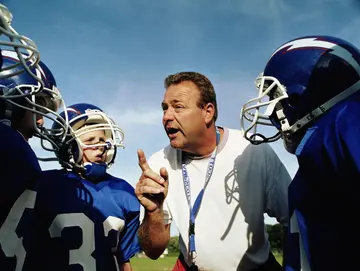Top 20 highest paying sports jobs in the world right now
Other Sports
Sports coaches are dedicated to helping their athletes achieve their full potential and reach their goals, but the coaching profession also comes with its own set of risks. From accidents and injuries on the field to potential lawsuits, trainers must be prepared for any eventuality. To protect themselves and their careers, coaches need to have insurance. Why do sports coaches need insurance?

We will explore why insurance is a must-have for sports coaches and the different types of coverage available to them. By understanding the importance of indemnity, coaches can make informed decisions about the level of coverage they need and ensure they are protected in any unexpected incidents.
Sports trainers play a vital role in helping athletes achieve their full potential and reach their goals. However, the training profession also comes with its own risks, from accidents and injuries on the field to potential lawsuits. To protect themselves and their careers, sports trainers need to have indemnity.
Top 20 highest paying sports jobs in the world right now
Other Sports

There are several reasons why sports trainers need indemnity. One of the most significant risks is the potential for accidents or injuries on the field. Injuries can happen even with proper training and safety precautions in place, and mentors can be held responsible for any accidents that occur during a practice or game. Having indemnity can help cover medical expenses for the injured athlete, as well as provide legal protection for the trainer if they are sued.
Yes, they do. Another reason sports trainers need indemnity is the possibility of facing a lawsuit. In today's litigious society, mentors can be held responsible for any actions that harm an athlete or third party.
This could include a range of situations, such as a mentor giving improper instructions that result in an injury or a trainer failing to provide a safe playing environment. Having indemnity can give mentors the legal representation and financial support they need to defend themselves in court.
Which are the most popular sports for girls? An informative list
Other Sports

Trainers can also benefit from indemnity in the event of an emergency. Emergencies can happen anytime, and trainers must be prepared to handle them. Having insurance can provide trainers with access to emergency medical care, as well as support for travel and accommodation if they are far from home.
This can help ensure that trainers can respond quickly and effectively in the event of an emergency and can help minimize the impact of the emergency on their athletes and teams.
Several types of insurance sports trainers can consider, depending on their specific needs and risks. One type of indemnity is liability insurance, which covers mentors for any claims or lawsuits that result from their actions as a mentor. This indemnity can provide financial support for legal fees, as well as coverage for any settlements or judgments that may be awarded.
Another type of indemnity that trainers can consider is personal accident insurance. This indemnity provides coverage for accidents or injuries on the field or during coaching activities. This type of insurance can provide trainers with financial support for medical expenses, as well as support for lost income if they are unable to work as a result of their injury.
Which are some of the most common injuries in basketball?
NBA
Mentors can also benefit from an indemnity that covers emergency medical expenses. This insurance provides coverage for any medical expenses that result from an emergency, such as an injury or sudden illness. This type of insurance can help ensure that trainers have access to the medical care they need, regardless of where or what time it is.
Sports trainers play a crucial role in the development and success of athletes. However, the coaching profession also comes with its risks, including the possibility of accidents and injuries, lawsuits, and emergencies.
To protect themselves and their careers, sports mentors need to have indemnity. By understanding the different types of insurance available and their specific benefits, mentors can make informed decisions about the coverage they need and ensure they are protected in any unexpected incidents.
Life coaching insurance is a type of indemnity designed specifically for life trainers. It provides coverage for claims or lawsuits arising from their professional activities as life trainers. This indemnity can help protect life coaches against financial losses, legal fees, and other costs associated with a claim or lawsuit.
NFL waterboy application: How to become a waterboy in the NFL
NFL
There are several types of life coaching indemnity that coaches can consider, including professional liability indemnity, also known as errors and omissions insurance. This insurance provides coverage for claims or lawsuits that result from mistakes or omissions in the coach's professional work.

For example, if a client claims that the trainer provided poor advice or failed to achieve the desired outcome, this indemnity can provide coverage for the coach's legal fees and any settlement or judgment that may result.
Another type of life training indemnity that mentors can consider is personal injury insurance. This indemnity provides coverage for any personal injuries that may occur due to the coach's professional activities. For example, if a client trips and falls in the coach's office, this indemnity can provide coverage for the client's medical expenses and other costs associated with the injury.
According to data from the Bureau of Labor Statistics, the median annual salary for trainers and scouts in the United States was $35,850 as of February 2023. However, the top 10% of coaches and scouts earned more than $73,560 annually.
Which are the best sports insurance companies in the world currently?
Other Sports
The salary of a sports trainer can vary widely based on several factors, including their level of experience, the sport they coach, and the location of the team or organization they work for.
Head coaches in professional sports can earn significantly more, ranging from hundreds of thousands to millions per year. For example, the average salary for an NFL head coach is around $3 million per year, while the average salary for a manager in Major League Baseball is around $1 million per year.
College coaches can earn substantial salaries, particularly at major universities with successful athletic programs. According to USA Today, the average salary for a Division I football coach was over $2 million in 2023, while the average salary for a Division I men's basketball trainer was over $1 million.
Why do sports coaches need insurance? It is for several reasons, including protecting against accidents and injuries on the field, the possibility of facing a lawsuit and being prepared for emergencies. Different types of indemnity, such as liability insurance, personal accident insurance, and emergency medical expense insurance, can provide coaches with financial support.
What is the easiest sport to play right now and why is it the easiest?
Other Sports
READ ALSO: FIFA VS PES: Which is better, and what are the main differences between the two?
Sports Brief has recently posted about two video games. The FIFA and PES franchises have been long-time rivals in the world of soccer video games.
Both games offer players the opportunity to experience the thrill of playing as their favourite teams and players, but each has unique features and gameplay mechanics. FIFA vs PES is a debate that has been endless over the years.